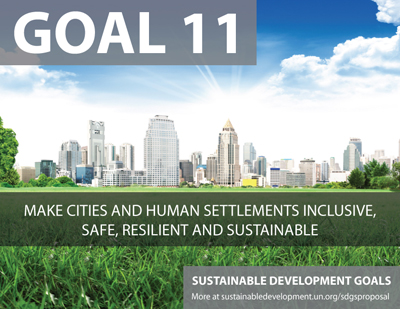|
| Workshop Partner |
|
Working Group discussing Goal 11 “Make cities and human settlements inclusive, safe, resilient and sustainable”
| Mr. Aromar Revi, Director, Indian Institute for Human Settlements, addresses via video message |
Cities are hubs for innovations, social and cultural development, economic productivity and prosperity and much more. However, cities also face difficulties such as congestion, lack of funds to provide basic services, a shortage of adequate housing and declining infrastructure. Cities are also associated with degradation of environmental quality.
The future we want includes cities of opportunities for all, that are safe and provide access to basic services, energy, housing, transportation. Education would have a key role to play to advance policies that make such cities possible, that transforms municipal governance and systems, that engages local communities and especially young people in conscious change for sustainability. However, discussions on urban challenges have remained somewhat limited in their exploration of the role of ESD in addressing these.
Aim of the workshop
This working group explored how to advance achievements of the targets of the UNSDG 11 with education as a driver, especially in the five priority action areas identified in the UNESCO Global Action Programme on ESD . An overall paper was developed to highlight the role of ESD in achieving Goal 11 and its targets.
Objectives
The working group aimed to provide an opportunity for collaborative thinking / reflection on:
- What are some education efforts in the Goal 11 target areas – what has worked well and why, what are some key learnings
- What is the nature of the challenge for education efforts and what are the opportunities
- Is there a typology of educational efforts that are particularly effective in bringing about transformation at different scales
- What can be a strategy to promote ESD in relation to Goal 11
Papers /case examples of Education in relation to any of the Goal 11 target were especially welcome. Participants were encouraged to send in abstracts and also to which can be used to develop the matrix
 Expected Outcomes
Expected Outcomes
- Enhanced understanding of the role of Education in relation to Goal 11
- Think piece(s) on ways forward for advancing policy, whole institution approaches, engaging educators and trainers as multipliers, engaging local communities and especially young people in implementing Goal 11 in their own city
- Stronger community of practice of urban educators
CEE Focal Point: Sanskriti Menon
Readings
Urban SDG 11
Unesco GAP Framework
IPCC AR5
UN Habitat III preparatory documents
Workshop Sessions
Date & Time |
Session Title |
Session Details |
Speakers |
11 January 2016 |
|||
Session I |
Towards Inclusive Cities- An Educational framework |
Making cities inclusive, safe, resilient and sustainable - How can Education Contribute?
|
|
Working Session II |
Re-orienting Urban Planning |
Re-orienting Urban Planning for Sustainability - The Role of Education and Social Learning |
Academics & Research, IIHS (on skype) |
12 January 2016 |
|||
Working Session III A |
Rejuvenating natural and cultural heritage |
rejuvenating cultural heritage
|
|
Working Session III B |
Transforming Urban Transportation/mobility |
|
|
Working Session IV |
Education for inclusive participation |
Role of Education to enhance inclusive participation sustainable urbanization and capacity for participatory, integrated and sustainable human settlements planning |
|
13 January 2016 |
|||
Session V |
Slums – Enabling mechanisms for the Bottom and Top to Work Together |
Policy orientation and community engagement for slum up gradation |
|
Session VI |
Role of Education in Making Goal 11 a Reality – Inspirations, Challenges and the Way Forward |
Role of Education in Making Goal 11 a Reality – Inspirations, Challenges and the Way Forward
|
|



